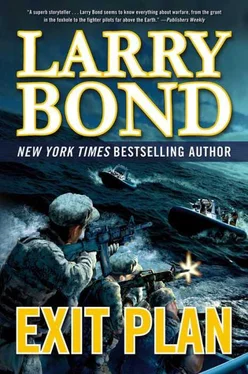The band, in perfect step, marched to its assigned position and the rest followed. While the casket was moved from the caisson to the stand, guides escorted Judy and the others to their chairs. There was some jockeying among the brass as they found their seats.
The Swedish ambassador had a place of honor, in front, close to the family. After the public release of the files from Shirin’s flash drive, the Iranians had been so desperate for any good press that they’d almost begged the Swedes to take custody of Higgs’s remains. His body was returned home in just over a week, while the words “Iranian nuclear program” had become the new catchphrase for any undertaking that was fantastically expensive, destined for failure, or both.
The top American official present at the funeral was the secretary of defense. Although some had suggested President Myles attend, his presence would attach too much significance to the circumstances of Higgs’s loss. While the SEAL’s death and return had been very public, and was obviously linked to the release of the Iranian files in some way, most of the events connecting the two were still Top Secret, and would hopefully remain that way.
Instead, President Myles had shown his appreciation that morning, before the service. The award ceremony had been held at the Pentagon so the presence of so many military service members would not draw attention. Charlie Platoon and Michigan’s blue crew, along with their entire chain of command from the president on down, watched as Jerry and Ramey received Navy Crosses for their extraordinary gallantry and service to the United States at great personal risk. Lapointe, Fazel, and Phillips each received the Silver Star for their efforts, as did Guthrie for his overall handling of the crisis and his successful engagement against unspecified “enemy forces.” Frederickson got the Meritorious Service Medal for his efforts in directing the critical reachback support that ultimately resulted in the successful conclusion of a mission of “significant importance to the United States.” And of course, Jerry, Ramey, and Lapointe received their Purple Hearts. Michigan’s blue crew was awarded the Presidential Unit Citation.
Family members quietly clapped with each presentation. Shirin had teared up watching Fazel get his award. Emily and Clarice had hugged each other, but then Emily had just buried her face in a hanky and cried, relief mixing with pride.
Judy Higgs had stood in line with Jerry and the SEALs, the kids standing quietly on either side of their mom. Myles posthumously awarded Higgs the Navy and Marine Corps Medal, along with his Purple Heart. After reading the citations and handing her the medals, he leaned close to her. They whispered softly to each other for several moments, then the president straightened and stepped back. Later, Judy refused to tell anyone what they had talked about.
At the reception afterward, Jerry had found Patterson and Hardy. “The medals look good on you, Jerry,” congratulated Hardy.
“Too bad I’ll never be able to tell anyone what they’re for,” Jerry joked. Unfortunately, it was true. The president had read a glowing but somewhat generic citation to the assembled group before giving the awards. The actual citation was classified. Anyone who looked in Jerry’s service record or those of any of the others would find a form instructing them to call a special office in the Navy Personnel Command, assuming they had the clearance.
“I’m sorry we couldn’t do more to help you, Jerry,” Joanna lamented.
“You were busy trying to stop a war,” Jerry said. “You’re lucky the Israelis only PNGed you. What will happen if they find out using Reagan’ s fighters was your idea?”
“Oh, they know,” Hardy said, “and the problem is that I really liked Tel Aviv. I was hoping we could go back some time and play tourist.”
Joanna reassured him. “Israel and the U.S. need one another. We’ll sort it out. Give them time to see that we saved their rears, and elect a new government.” Putting a hand on Hardy’s arm, she turned to Jerry and said with considerable pride, “The president was very impressed with his diplomatic skills.”
“Which meant I know which end of the two-by-four to use,” Hardy joked. “I doubt if Andy Lloyd will want me in the State Department.”
“But I think you’re going to be offered a seat on the Foreign Relations Committee,” she countered.
They’d decided it wouldn’t be appropriate to come to the funeral, so Jerry had been grateful for the chance to see them.
At the gravesite, Jerry ended up sitting right behind Secretary of Defense Springfield, with Emily behind the chief of naval operations and Captain Guthrie behind the commander of the Special Operations Command.
It was almost instinctive for junior officers to be nervous in the presence of such senior officials, to defer to those who bore such great responsibility, but Jerry saw their presence as an acknowledgement by the chain of command of Higgs’s service and sacrifice. To Jerry, the real dignitaries were the rows of warriors filling the seats around him.
The service was very short — some prayers, a Bible reading, and a hymn sung by a vocalist from the Navy choir. The escort fired three volleys, which seemed surprisingly loud to Jerry, given what he’d experienced, and a bugler played “Taps” without missing a note. Then the six sailors acting as pallbearers pulled the flag taut and began giving it the thirteen folds, while a lone bagpiper, a retired Navy SEAL, played a solemn “Amazing Grace.” The honor guard finished their work with a neat blue and white triangle. Not a hint of red was visible.
The escort passed the folded flag to the commander of Seal Team Three, who knelt in front of Judy Higgs and handed her the folded triangle, the straight edge facing her. He started to speak, “On behalf of a grateful nation…” and the SEALs sitting around Jerry began to stand and form a line to one side of the casket. Jerry stood as well, and spotted Lapointe, who nodded to him and made space for him to stand.
The SEAL at the front of the line waited until the commander had finished and took his place at the head of the line. Then Lieutenant Ramey gently let go of Judy’s hand, stood, and walked over to join them. The SEAL commander helped Ramey, Higgs’s closest friend, but hampered by his cast, remove the gold SEAL Trident from his uniform blouse and position it on top of the casket. With two sharp raps, Ramey pounded it straight and square into the wood surface. Stepping back, he rendered a final salute to his friend, his comrade in arms. As Ramey returned to his seat, each SEAL came up in turn, added his own trident pin, and rendered honors.
As he stood with Lapointe, Jerry watched petty officers and commissioned officers, from third class to captain, remove their tridents and pound them into the casket.
As they approached the front of the line, Jerry whispered, “Good thing it’s not a metal casket.”
“We’d manage,” Lapointe said firmly.
Jerry took another step forward and saw Judy, holding Ramey’s hand. Her face looked drained, weary. She’d sacrificed much, but she wouldn’t be left behind. There’d be a long line of supporters to help her through the difficult days ahead; SEALs take care of their own.
Lapointe was the last SEAL in line. He slapped his trident into the wood, saluted, and hobbled away smartly. Now it was Jerry’s turn. Jerry removed his gold dolphins and carefully placed them in line with the other insignia, and gave them two sharp raps. The pins bit deeply into the lid. By now, two rows of gold tridents ran the length of the coffin, and he was adding to a third.
It was more than just saying good-bye. Even in death, they wouldn’t leave their comrade. He would never be alone.
Читать дальше












